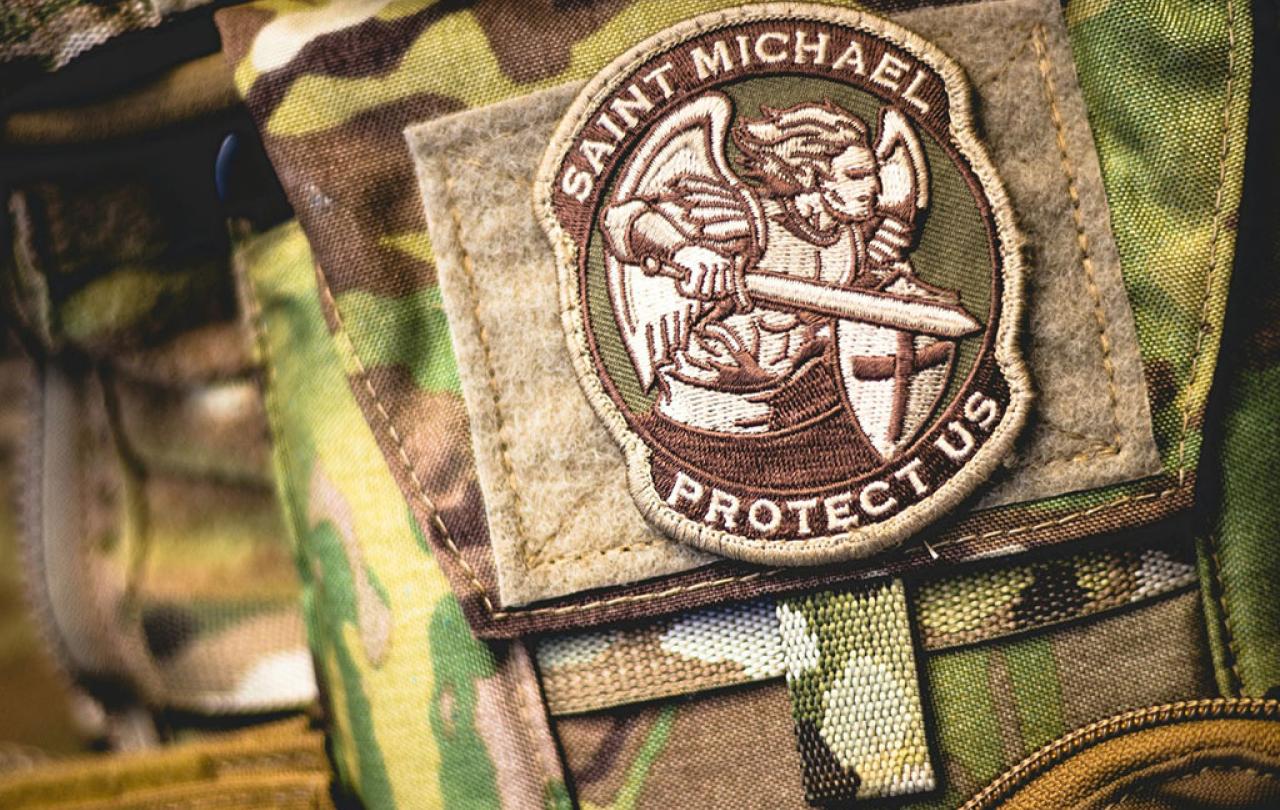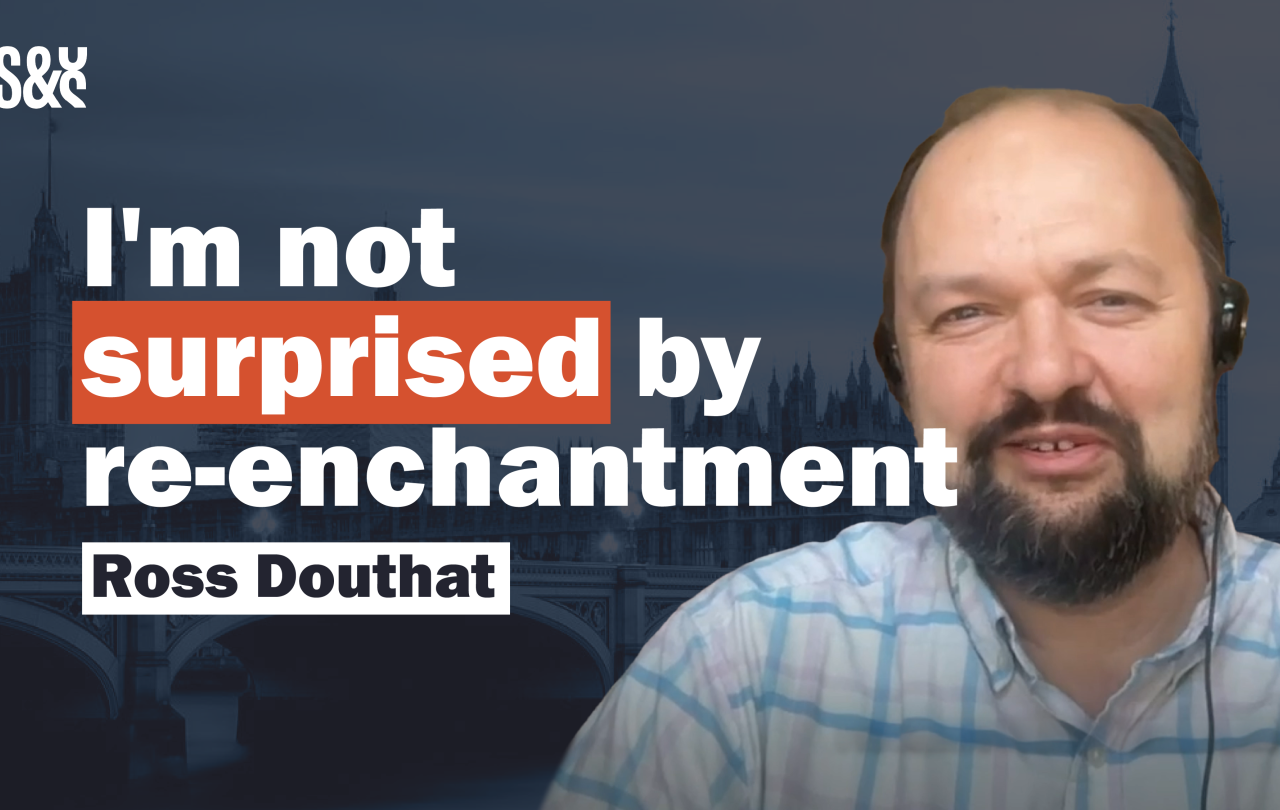
St Michael is everywhere. But only if you have eyes to see him. He’s probably somewhere in your town. He may even be hiding in your wardrobe in one of your jumpers. Retailer Marks and Spencer trademarked the ‘St Michael’ brand in 1928. It was inspired by their best-selling hosiery brand – St Margaret. The name Michael came from the founder of M& S, Michael Marks. But the logo they used, a winged angel holding aloft a sword, was a reference to the archangel St Michael mentioned in the Bible.
Even in the pages of that book, however, St Michael is a little elusive, being named only a handful of times. Perhaps that was his mystique. Less is more. But whatever St Michael was doing worked really well in the Middle Ages. A tradition arose around him, culminating in a feast day known as Michaelmas on 29th September. This feast day had extra significance as it become a ‘Quarter Day’.
In days gone by, the year was divided into four, bookended by quarter days. Michaelmas was one, at least in England. The next is Christmas Day, followed by Lady Day (March 25), and Midsummer (June 24). Rents were traditionally due on quarters days. Legal and financial contracts were to be settled. Michaelmas was particularly associated with the domestic servants moving around. You will hear it referred to Michaelmas along those lines in Chapter One of Pride and Prejudice.
Dragon sightings may have declined sharply since the seventeenth century, but they have come roaring back in the last few decades.
Many schools called their autumn term ‘Michaelmas’. Mine did, although no-one ever explained what it meant. As schools began to dominate British life, the calendar year ceased to be broken into four but three. Now our lives are regulated by school holidays, ‘back to school’ days and half term, when it is traditional to double the cost of your holiday rental. Christmas remains. Lady Day morphed into the end of the tax year. (I’m sure the Virgin Mary would be thrilled). And Midsummer Day has vanished almost completely.
St Michael had a good run. He had been a wildly popular figure from Anglo-Saxon times and Michaelmas a firm fixture in the calendar. Many churches founded in that period were named after him. Over 800 of those churches dedicated to St Michael remain in England, scattered across the counties. (I walked around one on Sunday afternoon in East Coker, Somerset where the ashes of TS Eliot have been interred.) Only the Virgin Mary, St Peter and All Saints are more popular in the church dedication charts.
In short, St Michael was a big deal. Why? Because he was a dragon killer.
In fact, Michael was not just ‘a killer of dragons’ but ‘the killer of the dragon’. That dragon is the silver-tongued serpent, Satan himself. The final reference to Michael in the Bible reads thus – and yes, it sounds better in the King James Version:
And there was war in heaven: Michael and his angels fought against the dragon; and the dragon fought and his angels, and prevailed not; neither was their place found any more in heaven. And the great dragon was cast out, that old serpent, called the Devil, and Satan, which deceiveth the whole world: he was cast out into the earth, and his angels were cast out with him.
St Michael is the defeater of evil itself. This is a comforting figure when boatloads of Vikings could appear in your shire at any minute in order to destroy, steal, rape and pillage. The fact that these longboats had a dragonhead on the prow served only to reinforce this image that the enemy were representatives of Satan himself.
Dragon-slaying was a staple of heroic tales. Beowulf naturally fights a dragon. Merlin is mixed up with a dragon called Kilgharrah. There are also dozens of accounts in which dragons are slain, often presented in a prosaic and serious way, like a report of pest control. Not far from me in the woods near Wells, the Bishop Jocelyn killed a dragon in 1320s. The latest account like this is in 1614 , reporting a “strange and monstrous serpent” living in St Leonard’s Forest near Horsham in Sussex “to the great annoyance and diverse slaughters both of men and cattle, by his strong and violent poison”.
Dragon sightings may have declined sharply since the seventeenth century, but they have come roaring back in the last few decades. Dragons are everywhere. Our TV screens are constantly invaded by insatiable fire-breathing serpents. Bookshops bulge with titles about dragons.
When you see those efficient, bloodthirsty killers jumping off their dragon-headed longboats, good and evil don’t seem like relative concepts.
Has the time come for St Michael to return? Surprisingly not.
St Michael has not been summoned because he is a dragon killer, and we don’t want to kill dragons. Not anymore. We want to tame them. We want to understand them. We want to harness their power.
That’s what happens in Game of Thrones. Daenerys Targaryen wishes to assert her claim to the throne of the Seven Kingdoms of Westeros using the dragons that she has hatched. But can she use those dragons to bring about justice or ‘the greater good’ without being consumed by them or becoming dragon-like herself? It is an eternal question, played out in the Cold War with nuclear weapons and in Middle Earth with a powerful ring.
We are seduced by the allure of the dragon all too easily. It’s there at the very beginning of Western Culture in the Bible: Eve is approached by a persuasive snake who tempts her to eat from the Tree of the Knowledge of Good and Evil. She falls for it. But throughout the Bible, the one blamed for the sin is not Eve, but Adam.
But how is it Adam’s fault? Adam failed to give the serpent the Archangel Michael treatment. Adam should have killed the serpent or chased it out of the garden. He didn’t because, well, things were just starting to get interesting. And the rest is theology.
St Michael is the extinguisher of evil. But we don’t want to destroy evil. We just want to see it diminished. A bit. In fact, the talk of Good and Evil is rather embarrassing. We don’t do Good and Evil. We do ‘values’. We don’t condemn sins. We seek to re-educate those with ‘anti-social behaviours’.
We have the dubious luxury of speaking this way because we aren’t about to be attacked by Vikings any times soon. When you see those efficient, bloodthirsty killers jumping of their dragon-headed longboats, good and evil don’t seem like relative concepts. Evil is very real. That’s when you might need some clean pairs of Marks and Spencer’s famously excellent underwear.
Scroll the news and you will find that millions around the world live with the reality of Viking-like terror right now. For them the virtues of St Michael might be more apparent.





